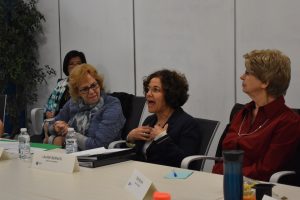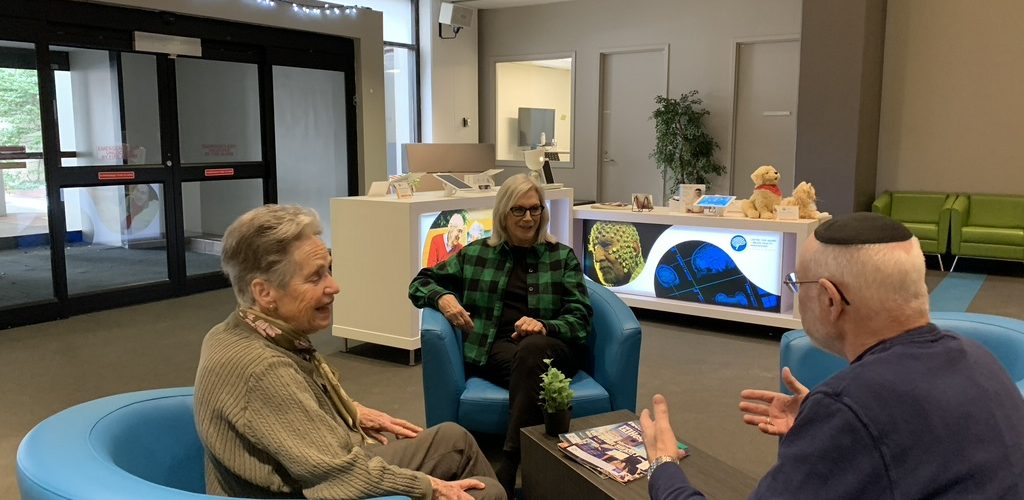While many older adults are experiencing higher levels of social isolation throughout the pandemic, not everyone is being impacted in the same way – something Alison Dube* says innovators should consider when developing resources for seniors.
“Innovations should be timely, relevant and direct,” says Dube. “But they also need to be diverse, not a one-size-fits-all solution.”

Dube was part of a group of older adults who joined the Centre for Aging + Brain Health Innovation (CABHI) for a virtual community discussion about the impact of COVID-19 on cognitive health and social isolation last month.The discussions helped identify the various ways older adults were coping with social isolation during the pandemic.
For example, some participants were content with virtual solutions, such as Zoom, as an alternative for staying connected with family and friends. Others, however, felt virtual meetings could never replace in-person interaction.
“Social isolation is very hard for me, but I’ve made it work,” says Syrelle Bernstein, a discussion participant and member of CABHI’s Seniors Advisory Panel. “But to be isolated and alone, and not able to hug someone – it’s been difficult.”
For other participants, meaningful moments of engagement, such as sharing a joke or playing an online game, outranked their need for face-to-face interaction.
“Innovations should be timely, relevant and direct. But they also need to be diverse, not a one-size-fits-all solution.”
As a widower for more than 20 years, Walter Seaton says COVID-19 physical distancing requirements have only made a small dent in his normal routine, except for when it comes to his independence.
“The only thing that’s changed for me is that I rarely go out,” says Seaton. “I have a daughter and a very good friend who are both adamant that I don’t go shopping; they do it for me.”
Older adult caregivers for people living with dementia and other cognitive impairments are also facing unique challenges due to COVID-19. Visitation restrictions in long-term care facilities mean they are unable to provide in-person care and support to their loved ones.
“I’m fortunate that my mom is in a good long-term care home,” says Sue Drohan. “But not being able to explain in person why I can’t see her has been hard.”
One participant pointed out that even when technology is available to help them stay in touch with loved ones, their family member may have trouble navigating it. Not being able to connect with their loved-ones in person can heighten the negative effects of social isolation and contribute to poor mental health among older adult caregivers.
How can innovators address the nuanced needs of older adults in and out of a COVID context?
Despite their varying experiences, all discussion participants agreed that they hoped to see more dynamic COVID-19-related solutions that addressed a range of physical, social and cognitive needs.
Some of their suggestions included:

CABHI’s Seniors Advisory Panel meets with innovators to provide feedback on their solutions.
- Innovations that incorporated structure and consistent scheduled programming, such as an exercise class or lecture, to help overcome feelings of isolation
- Solutions that could help older adults safely contribute to their communities through volunteer work
- Technology that could support interactions between older adult caregivers and their family members living with dementia
- Online activities, such as exercise classes and interactive games that accommodate for older adults with a range of cognitive and physical abilities
- Innovations with intuitive and easy-to-use interfaces
- Tutorials on how to incorporate innovations into daily routines
Supporting the well-being of the world’s aging population will be critical during the COVID-19 pandemic and beyond. Accomplishing this mission will mean valuing the opinions of older adults, says Syrelle Bernstein.
“I think people are vital to the day they close their eyes and are gone,” says Bernstein. “Older adults are worth listening to.”
Even after the virus is resolved, the long-term effects of social isolation will continue to negatively impact older adults at higher rates than the general population. Innovating for seniors with seniors will allow the aging and brain health ecosystem to develop, validate and accelerate diverse, life-changing solutions that will support healthy aging moving forward.
Initiatives like CABHI’s Seniors Advisory Panel, and virtual community discussions allow innovators to do just that – hear directly from older adults and those who will benefit from aging and brain health products, services and best practices. As the global longevity sector continues to wade through this shifting healthcare climate, listening and learning from those we hope to serve will be critical to making healthy aging a reality for everyone.
* This name has been changed due to privacy concerns


